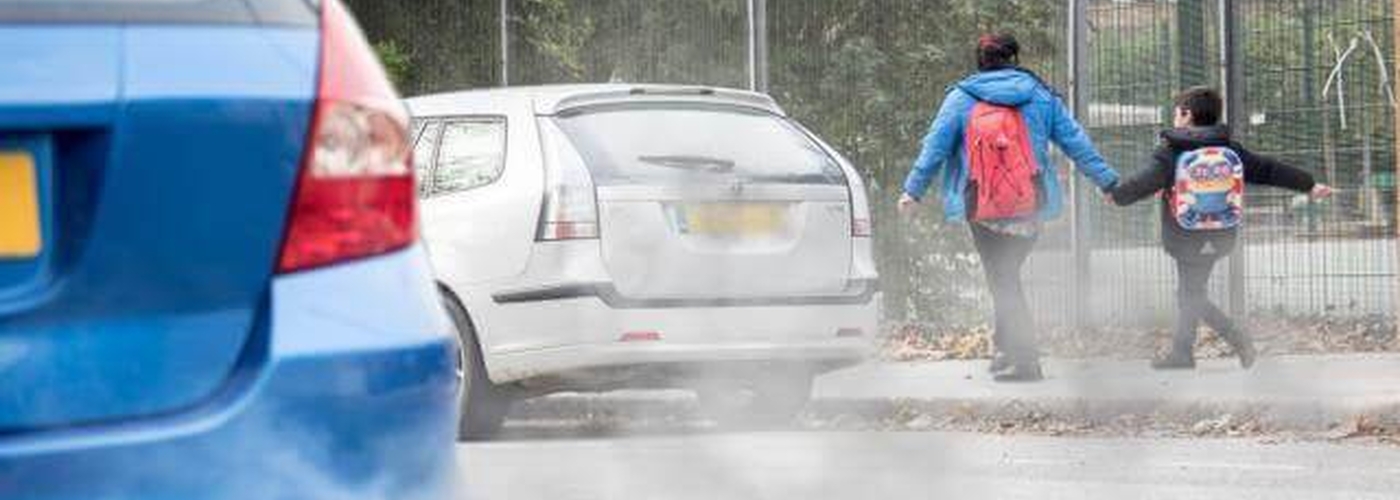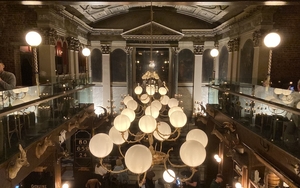Andrea Sandor explores the controversy of placing a car park next to a primary school
The day after declaring a Climate Emergency, Manchester City Council announced plans to use the 10.5 acre Central Retail Park as a temporary 440-space car park for up to five years.
The proposal has kicked off a fierce backlash, mobilising campaign groups across the city and garnering national coverage by the BBC, The Guardian and Forbes. An online petition currently has nearly 9000 signatures.
At the heart of the controversy is New Islington Free School.
Manchester lavishes motorists with transport space, even though they make a minority of journeys
The massive retail units that acted as a buffer between the primary school and car park have gone. A thin strip of trees and a ‘contractor’s compound’ will be all that stand between it and the toxic fumes from Great Ancoats Street, one of the city’s most polluted roads with NO2 levels breaching legal limits.
Research shows children who grow up exposed to air pollution will develop significantly smaller lungs than those who don’t, putting them at risk for asthma and respiratory problems. That’s the price children growing up in the city centre are paying for living in our car-dominated city with ‘lethal and illegal’ levels of air pollution.
The Council wishes to use the site as a temporary car park to raise income - but the Central Retail Park plans force us to question how we raise money and at what cost.
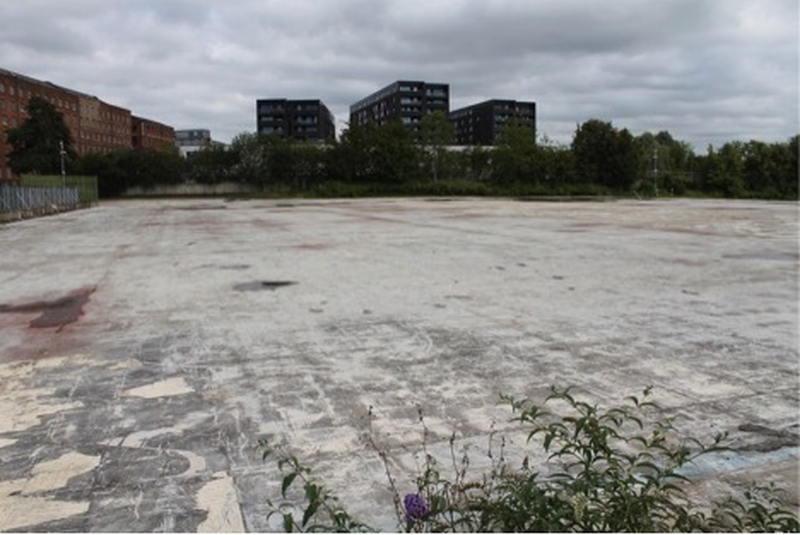
The Council bought Central Retail Park in 2017 in what has been described as the largest land purchase in the history of the city - although the exact price is undisclosed due to ‘commercial sensitivity’. The long-term plan is to develop the site with the Abu Dhabi United Group* into a high density mixed-use office and residential scheme.
(*NB: If mention of Abu Dhabi raises red flags, then it should. Not only is the Council in a business partnership with a state that jails human rights activists, they recently censored mention of these links in a Peterloo Memorial performance. David Collins of The Times caught wind and covered the story.
The hypocrisy of Manchester City Council is quite staggering. Town hall ‘censors’ Peterloo massacre memorialhttps://t.co/S1R3g8oFle
— David Collins (@DavidCollinsST) August 24, 2019
The Council proposes using the site as a car park while development proposals are drawn up. I’d read on various sites that the income from the car park would go towards funding support services etc. However, when I asked the Council whether it had considered any other uses for the site, it gave another reason for using it as a car park – to help fund the purchase of the land:
“This use for parking was agreed by the Council at the time we agreed to buy the site both on an interim basis, to generate income to meet the revenue costs of the acquisition and site holding costs, and to alleviate parking problems in nearby residential neighbourhoods.”
The Council stresses the site is already a car park so council tax won’t be used to develop it. Currently, it says, revenue raised in council tax doesn’t even cover the cost of adult social care.
There’s no denying council budgets have been slashed under austerity. However, I must also point out the Council were able to rustle up an additional £19m towards escalating costs associated with the Factory performing arts venue.
If the Council wishes to raise revenue via parking, why not charge more at the many car parks already in the city centre? While a day tram pass from Zone 4 costs £7, you can park in the Council’s city centre car parks (run on behalf of the Council by NCP) for as little as £3.50 all day, and many earlybird discounts run from £5.50.
Here are just a few examples: 160-space Sheffield Street car park, £3.50; 958-space Arena car park, £3.87 per day with a season ticket; 1,383-space Arndale car park, £5.50. NCP was contacted to clarify the Council's input on setting tariffs. The company declined to comment.
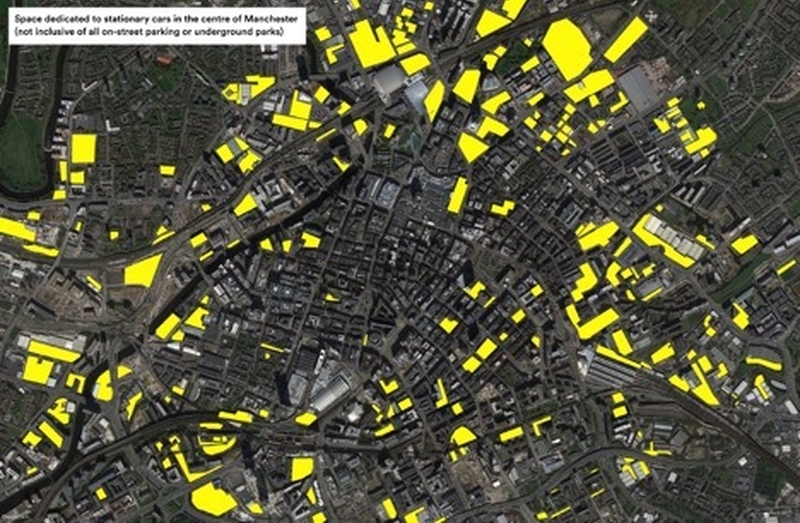
Provocative new analysis by property data analyst Urban Info Manchester has made headlines in Forbes, detailing how around 60% of Manchester’s transport infrastructure is dedicated to motorists, even though they account for just 13% of journeys into the city centre. Significantly more people take the train into the city - 38% - and yet train stations and railroads only take up 20% of available space. While 25% use the tram, it takes up just 7% of the space.
This led Forbes to conclude Manchester ‘lavishes’ motorists with transport space, even though they make a minority of journeys. Urban Info’s analysis only accounted for surface car parks, meaning the space dedicated to cars is actually far higher when you factor in the 2,052 council on-street spaces and multi-storey car parks.
As Urban Info highlights, using a site as a car park while development plans are drawn up isn’t uncommon practice in Manchester. “However,” it says, “things have changed. The city centre is now home to about 200 times the number of residents as at the start of the century, and they are starting to take a great interest in the way the city is changing and developing … The quality of our air, and the dominance of car-friendly infrastructure across the city are two key concerns.”
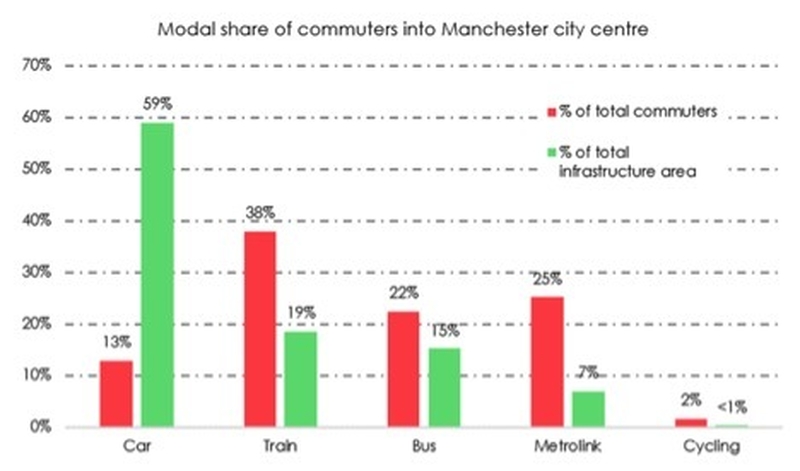
The city centre has schools now. New Islington Free School opened in 2014 to accommodate the influx of families. Placing a car park next to the school - especially without the barrier of the retail units - will almost certainly negatively impact the children’s health. Moreover, while the Council tells me “this proposal will not generate more traffic”, research suggests otherwise.
Researchers at the University of Connecticut have found solid evidence that parking is a “likely cause” of increased driving. If there’s a new, massive, cheap car park in town, more people may well opt to drive there rather than use public transport that Andy Burnham himself has called "fragmented and unreliable". The Council say the car park won’t increase traffic flows; it would be nice to know what evidence this is based on.
Either way, the car park plans certainly won’t decrease traffic, which is what’s needed on one of Manchester’s most polluted roads. Now cars will be parking up close without any meaningful barrier to shield students.
Like never before, the Council has a duty of care towards an increasing number of children growing up within its wards. It has declared a Climate Emergency to help protect them - now it needs to act on that promise.
Follow Andrea Sandor on Twitter @wordstoseeby
Next week: Part 2
I look at the impact of pollution on children’s health and how the local community is mobilising to build a park to combat the climate crisis.





